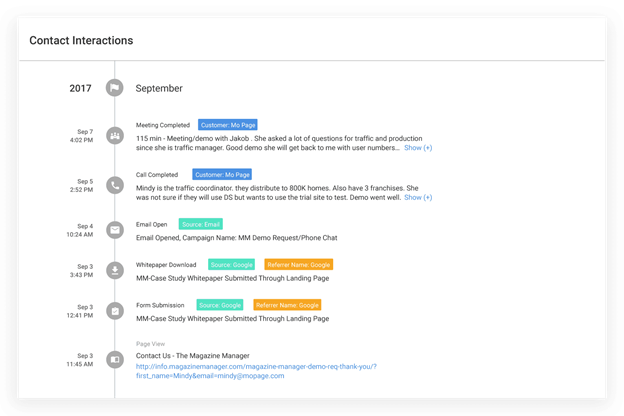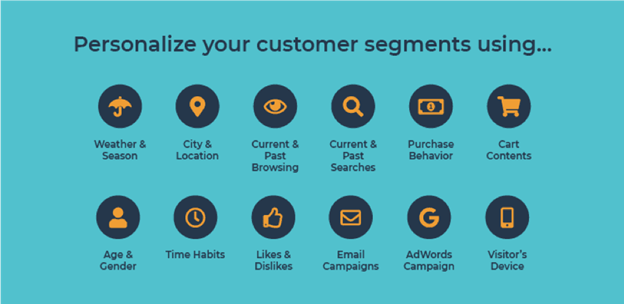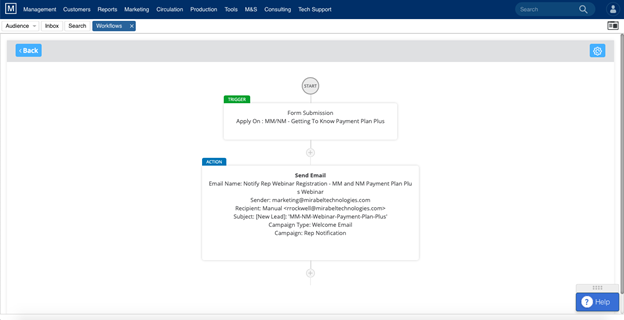Successful companies know their customers. Why? It’s the preferences and feedback of your potential and current customers that dictate the direction of your product or service, and ultimately the growth of your company.
However, many companies have difficulty organizing, analyzing, and acting on the data these users provide. The data could be their clickstream across your website or social media, email communications with salespeople, or basic demographics and contact information.
It seems like a daunting task to organize and nurture every user according to where they are in the buying process. Fortunately, a specific marketing automation software exists to make it possible.
What is CRM Software?
CRM stands for customer relationship management. As the name implies, this marketing automation software manages the relationships with your customers, potential and current. A robust CRM manages the digital interactions that a customer has with your company, including social media follows and interactions, visits to your website, email clicks and opens, and so on.
Most CRMs also include who these customers are by finding relevant demographic information like email address, phone number, and physical address. If relevant, it might also find their company name, revenue, related key decision makers, and more.


As a central tool to track a customer’s needs and wants, customer relationship management tools are important for sales and marketing teams. It answers key questions about your customers:
- Who are they?
- How do they like to interact with our content?
- What products or services are the most popular?
- How do we get in touch with our customers?
- What does our lead nurturing process look like?
- Are we providing our customers with answers to their pain points?
By logging interactions and understanding where your customer is in their buying process, a CRM keeps marketing and sales teams on the same page. No customer details fall through the cracks, as a marketing automation CRM ensures that everyone has access to key information about customers.
What Can a CRM Do for Your Company?
A robust CRM is capable of a variety of functions for your marketing and sales teams. From client acquisition and lead generation to customer retention and brand loyalty, a CRM drives higher ROI in every business strategy.
- Consolidates customer information in one database
- Segments customers into groups to serve them properly
- Quantifies opportunities with customers — lead scoring
- Reports sales analytics
- Automates aspects of sales and marketing processes
- Forecasts future sales
Information Consolidation
A common problem is that customer data is on multiple platforms. Oftentimes, it’s tracking data on various platforms (i.e. getting social media analytics from Facebook or Twitter, tracking email analytics from MailChimp, viewing heatmaps for websites). Using each platform’s data, you try to piece together who the customer is, what they’re looking for, where they’ve been, and how interested they are.
As a marketing automation software, CRM offers an easy way to manage all your customers’ information in a central database. This creates a seamless avenue of communication between your customers and company and your marketing and sales teams. A CRM’s ability to consolidate customer data in a unified manner increases efficiency.
Customer Segmentation
The best way to nurture a lead is to provide an answer to their problem, and the best way to keep a current customer happy is to do the same. However, these problems are different, because each user is in a different stage of the buying process. These problems could also differ due to industry, revenue, company size, and so on.
That’s why customer segmentation is important. Like list segmentation in email marketing, segmenting customers based on their shared characteristics is a way to create and execute effective marketing strategies. Customer segmentation “is the process of dividing customers into groups based on common characteristics so companies can market to each group effectively and appropriately,” according to Shopify.
For example, if your potential customers are magazine publishers, a great marketing strategy would be to segment content by each industry. All magazine publishers would enjoy information about how to turn a print publication into a digital publication. However, an interior design magazine might want different solutions than a sports magazine or family living magazine.
A CRM is a great way to segment customers and find their niches, so you can offer the best solution possible and become their go-to source.


Lead Scoring
A website visit, a social media follow, an email sign up. These are all digital actions of a lead, but which is the most valuable? Which indicates a higher quality lead?
As a marketing automation tool, a CRM collects and organizes each visit, follow, and sign-up. It also gives marketing and sales teams the ability to “score” each lead based on these actions.
Lead scoring, as The Pipeline defines, is “the process of ranking the sales-readiness of a lead using a predetermined methodology. The process goes like this: You determine which data points indicate a sales-qualified lead, and then assign point values to each of those criteria, ultimately leaving you with a final score for each lead. A lead scoring system allows you to take the subjectivity out of the process and truly understand which leads have the best chance of converting.”
By prioritizing which users are most likely to convert, you can increase the efficiency of your sales team and track which marketing strategies are working.
Sales Analytics & Forecasting
Just as you can track which sales strategies are working, CRM software allows you to do the same for sales. CRMs compile sales analytics, including conversion rates and click-to-close data, so you gain valuable insights on which sales strategies were most effective.
Marketing Automation
To start, what is marketing automation? It’s a software or digital tool that automates repetitive marketing tasks. It combines strategy and creativity to nurture leads into customers in a more efficient, streamlined way. The goal of marketing automation is to consistently provide timely, valuable, and tailored content at each point of the buying process.
Marketing automation and CRM go hand-in-hand. When you combine marketing automation with a robust CRM, you are able to form streamlined, efficient campaigns for your target audience that make it easy for sales and marketing teams to strategize for. These software tools leave little room for guesswork and increase lead generation, lead nurturing, lead scoring, conversion rates, and customer service.


Mirabel’s Marketing Manager CRM
With many customer relationship management tools on the market, it’s hard to determine which is best for your company. Mirabel’s Marketing Manager CRM hits a sweet spot by combining the robust tools of a big-name marketing company with affordability.
Save time, effort, and money by properly aligning marketing and sales strategies with our CRM and marketing automation software. Here’s what you can do with the CRM in Mirabel’s Marketing Manager:
- Support sales and marketing, deliver actionable insights, and facilitate team communication
- Ask for and segment customer feedback to improve your marketing and sales strategies
- Discover and sort your top customers with lead scoring tools
- Analyze predictive digital behavior by tracking website visit history, email open and click rates, traffic sources, and interest in content marketing like blogs and landing pages
- Follow a lead’s clickstream on your website and identify patterns of interest
- View and add notes to contact interactions in a clean, easy-to-read dashboard
The Future of Marketing Automation
This crash course in CRM software is the tip of the iceberg when it comes to the future of marketing automation. Most marketing automation softwares, like Mirabel’s Marketing Manager, include a robust CRM that’s capable of collecting and organizing key data from potential and current customers. This will help your marketing and sales teams align and adjust their strategies based on users’ digital behavior. If growing your company is your ultimate business goal, invest in marketing automation and a CRM.
Kelly Jacobson contributed to this blog.
SEE FOR YOURSELF
Watch an overview to learn how B2B marketing automation by Mirabel Technologies can help you increase traffic, optimize your funnel, drive more leads, improve conversions, and boost ROI — at a price you can afford!

